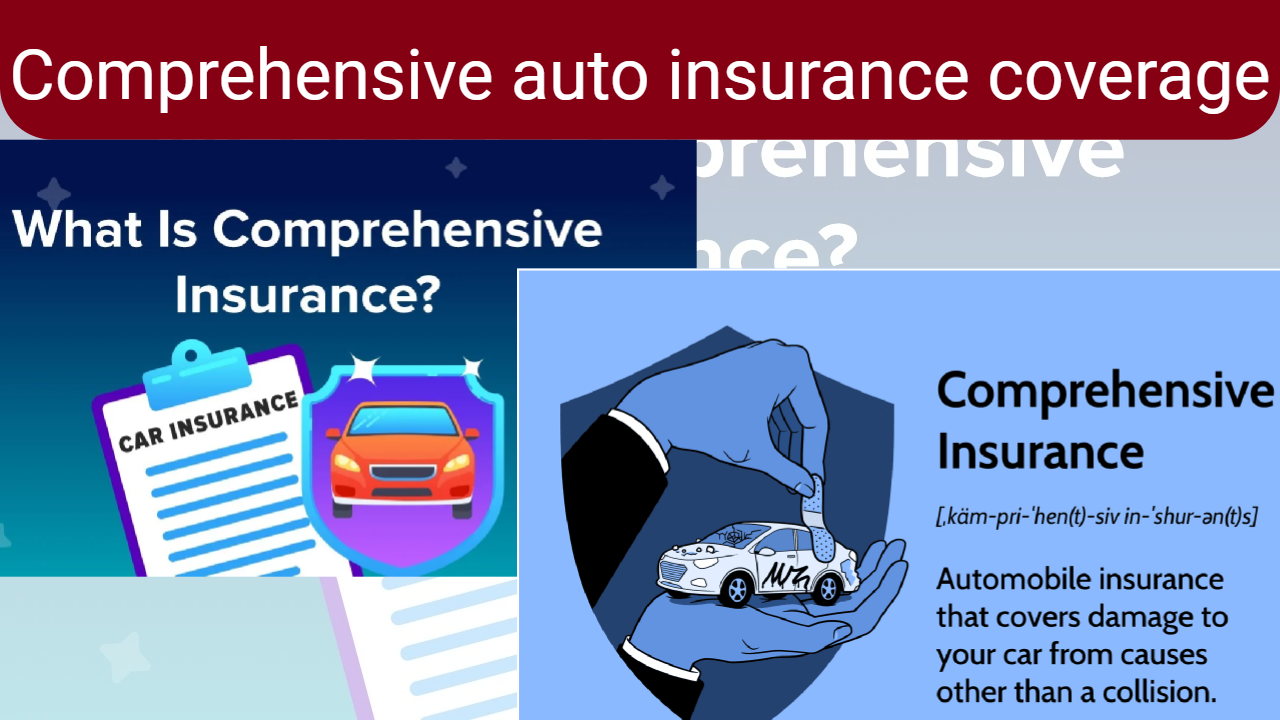Auto insurance is a necessity for anyone who owns and operates a vehicle. Among the various types of auto insurance, comprehensive coverage stands out for its extensive protection against a wide range of risks.

Comprehensive auto insurance coverage goes beyond the basics, covering damages to your vehicle that aren’t caused by collisions. This article explores what comprehensive auto insurance is, its benefits, what it covers, its costs, and tips for choosing the right policy.
What is Comprehensive Auto Insurance Coverage?
Comprehensive auto insurance, also known simply as “comprehensive coverage,” is a type of insurance that protects your vehicle from damage not caused by a collision. It is often referred to as “other than collision” coverage. This type of insurance is optional in most states but is typically required by lenders if you are financing or leasing your vehicle.
What Does Comprehensive Auto Insurance Cover?
Comprehensive auto insurance covers a wide array of incidents, providing peace of mind for vehicle owners. Here are some of the common events that comprehensive coverage protects against:
1. Theft
Comprehensive coverage will reimburse you if your vehicle is stolen. This includes the cost of the vehicle itself and any permanently installed equipment that is stolen along with it.
2. Vandalism
If your vehicle is damaged due to vandalism, comprehensive coverage will cover the repair costs. This includes damage from keying, graffiti, and other forms of malicious destruction.
3. Natural Disasters
Events such as floods, hurricanes, earthquakes, and tornadoes can cause significant damage to your vehicle. Comprehensive coverage protects you against these types of natural disasters.
4. Fire
If your vehicle is damaged or destroyed by fire, comprehensive coverage will pay for the repairs or the value of the vehicle if it is a total loss.
5. Falling Objects
Damage caused by falling objects, such as tree branches or debris from construction sites, is covered under comprehensive insurance.
6. Animal Collisions
Collisions with animals, such as hitting a deer, can cause severe damage to your vehicle. Comprehensive coverage will cover the repair costs in such incidents.
7. Glass Damage
Damage to your vehicle’s glass, such as a broken windshield or windows, is typically covered under comprehensive insurance.
8. Civil Disturbances
Damage resulting from civil disturbances, such as riots or protests, is also covered under comprehensive coverage.
Benefits of Comprehensive Auto Insurance Coverage
1. Extensive Protection
Comprehensive coverage provides protection against a wide range of risks that could otherwise result in significant out-of-pocket expenses. This extensive protection ensures that you are covered for many unforeseen events.
2. Peace of Mind
Knowing that your vehicle is protected against various risks gives you peace of mind. Whether it’s a natural disaster, theft, or vandalism, comprehensive coverage ensures that you are financially protected.
3. Financial Security
In the event of a total loss, comprehensive insurance can help you recover the value of your vehicle, reducing the financial burden of replacing it. This financial security is especially important for expensive or newer vehicles.
4. Required by Lenders
If you are financing or leasing your vehicle, comprehensive coverage is often required by lenders. Having this coverage ensures that you meet the requirements of your loan or lease agreement.
Costs of Comprehensive Auto Insurance Coverage
1. Premiums
The cost of comprehensive coverage varies based on several factors, including the make and model of your vehicle, your location, your driving history, and your chosen deductible. On average, comprehensive coverage is less expensive than collision coverage, but it still adds to your overall insurance premium.
2. Deductibles
When you purchase comprehensive coverage, you will choose a deductible—the amount you pay out of pocket before your insurance kicks in. Higher deductibles generally result in lower premiums, but you will pay more out of pocket in the event of a claim.
3. Factors Affecting Cost
- Vehicle Value: More expensive vehicles typically cost more to insure comprehensively.
- Location: Areas with higher rates of theft, vandalism, or natural disasters may result in higher premiums.
- Driving Record: A clean driving record can help lower your premiums.
- Coverage Limits: Higher coverage limits provide more protection but also increase your premiums.
Tips for Choosing Comprehensive Auto Insurance Coverage
1. Assess Your Needs
Consider the value of your vehicle and your personal circumstances when deciding if comprehensive coverage is right for you. If you live in an area prone to natural disasters or have a high risk of theft, comprehensive coverage is highly recommended.
2. Compare Quotes
Shop around and compare quotes from multiple insurance providers. Each company has its own method for calculating premiums, so it’s beneficial to get several quotes to find the best rate.
3. Consider the Deductible
Choose a deductible that fits your budget. While a higher deductible can lower your premiums, make sure you can afford the out-of-pocket costs in the event of a claim.
4. Review Policy Exclusions
Understand what is and isn’t covered by your comprehensive policy. Some policies may have exclusions for certain types of damage or specific situations.
5. Check for Discounts
Ask about discounts that may apply to your comprehensive coverage. Many insurers offer discounts for safe driving, bundling multiple policies, or having certain safety features installed in your vehicle.
Conclusion
Comprehensive auto insurance coverage provides extensive protection for your vehicle against a wide range of risks beyond collisions. While it adds to your overall insurance costs, the benefits of comprehensive coverage—including financial security, peace of mind, and meeting lender requirements—make it a valuable investment. By assessing your needs, comparing quotes, and understanding your policy details, you can choose the right comprehensive coverage to safeguard your vehicle against the unexpected.
Pet Insurance for Dogs and Cats: Protecting Your Furry Friends
Long-Term Disability Insurance Options: Securing Your Financial Future
Small Business Liability Insurance: A Comprehensive Guide
Comprehensive Auto Insurance Coverage: Everything You Need to Know